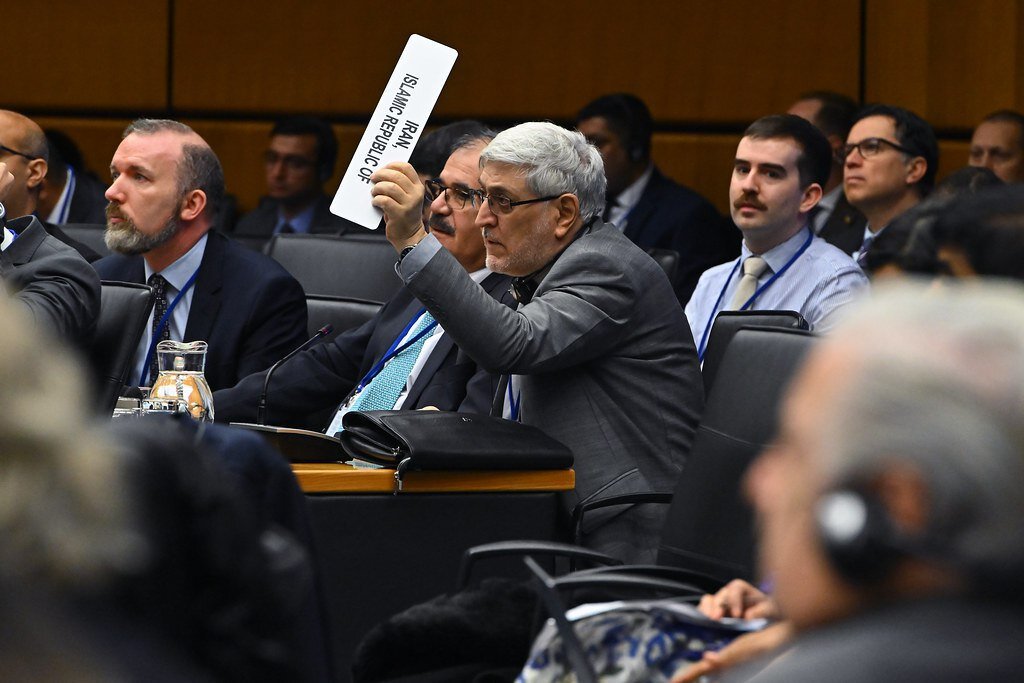West's nuclear blackmail
IAEA poised to pass anti-Iran resolution after Tehran warns it would take "commensurate" measures

TEHRAN – The already strained relationship between Iran and Europe seemed destined for a further deterioration Wednesday, as the International Atomic Energy Agency (IAEA) director-general held a press conference in Vienna following his return from Iran, and in advance of a critical IAEA Board of Governors vote scheduled for Thursday.
Rafael Grossi seemed to carry a cautious glimmer of hope in his remarks. While acknowledging some remaining hurdles, he reported "concrete results" from his talks with Iranian officials, suggesting a shift towards "less confrontational and more constructive" relations.
Grossi highlighted a willingness to engage: "What I see is a disposition to engage and to work with us—not only with the president but also with the foreign minister," he stated, adding that he'd been in "intense" contact with Iranian Foreign Minister Abbas Araghchi even the night before.
The IAEA chief revealed that Iran had agreed to cap its stockpile of 60%-enriched uranium and accept new inspectors. He, however, quickly tempered his optimism: "I cannot exclude the possibility that this commitment might falter as a result of further developments,” he said without mentioning that a looming anti-Iran Board of Governors resolution was among those “further developments”.
The elephant in the room, pointedly ignored by Grossi, was the core issue: Iran's concessions were made to preempt further European pressure related to the JCPOA. Despite the West's complete abandonment of the deal, Iran continues to largely uphold its commitments. Yet, Europe, it seems, remains indifferent to these demonstrable gestures of goodwill.
Reports indicate that Germany, France, and Britain could vote in favor of their own anti-Iran resolution at the IAEA's November board meeting as early as Thursday.
Iran's foreign minister has warned of a "proportionate" response from Tehran if the board passes the resolution.
For years, the E3 has regularly passed anti-Iran resolutions at the IAEA. However, this latest looming resolution carries significantly more weight as the world is nearing Termination Day, the day multiple UN Security Council resolutions on Iran’s nuclear program get terminated, 10 years after the JCPOA was adopted.
Once these resolutions are terminated, anti-Iran financial sanctions, as well as sanctions targeting nuclear-related material and technology and conventional arms would also be scrapped. The only thing that could stop this process is the “snapback”
The JCPOA and the snapback
The Joint Comprehensive Plan of Actions was signed in 2015 when Iran agreed to curb its peaceful nuclear work as a confidence-building measure in exchange for the removal of Western sanctions.
The 2015 nuclear deal collapsed in 2018 when the U.S. withdrew, re-imposing sanctions previously lifted under the agreement. In retaliation for Washington's withdrawal and the European parties' failure to mitigate the impact of the reinstated sanctions, Iran subsequently scaled back its compliance with the JCPOA in 2019.
In the long tale of the JCPOA, Iran has no way of punishing the West for shunning the deal. The West, however, does. The "snapback" is a mechanism outlined in UN Security Council Resolution 2231 that allows any of the five permanent members of the UN Security Council (P5) or Germany to reinstate UN sanctions on Iran if they determine that Iran is not complying with its commitments under the JCPOA. Essentially, it's a "reversal" or "snapping back" to a previous state of sanctions.
IAEA resolutions that say Iran has not been complying with its JCPOA commitments are the building block towards creating the road that leads to the activation of snapback.
What should Iran do?
At the time of writing this article, the specifics of the latest IAEA resolution against Iran remain undisclosed. Tehran's response will likely depend on the resolution's severity. Sources have told the Tehran Times that potential Iranian reactions could range from accelerating uranium enrichment and expelling UN inspectors to deploying more advanced centrifuges. However, international security analyst Abolfazl Bazargan argues that Iran should sooner or later recognize the futility of further cooperation with the West and the IAEA.
“The direction that Europe and the U.S. are pursuing is quite evident,” Bazargan told the Tehran Times. “Their focus isn’t on how much Iran is willing to engage in diplomatic resolutions. In fact, the nuclear issue is not their primary concern. The West aims to compel us to completely alter our foreign policy, sever ties with Russia, and cease our support for Resistance forces—demands we will never agree to negotiate.”
He went on to discuss the balance of power, stating, “The West possesses numerous strategies at their disposal, while we do not have the same leverage. Adjusting our uranium enrichment levels or deploying new centrifuges will not lead to any concessions from the West. However, withdrawing from the NPT could.”
Leave a Comment